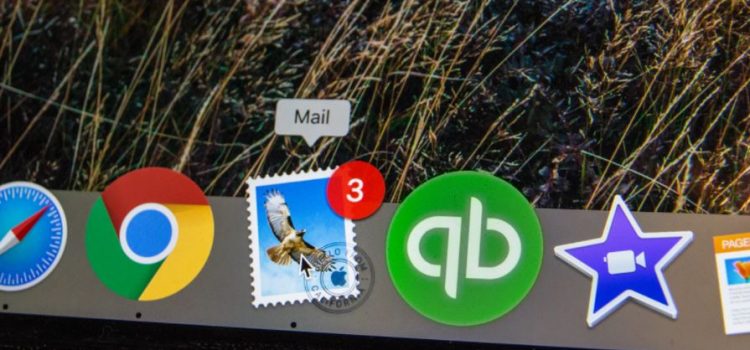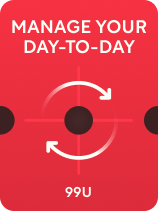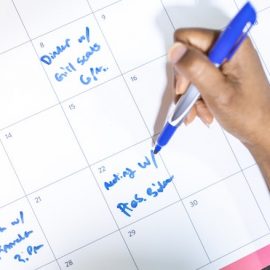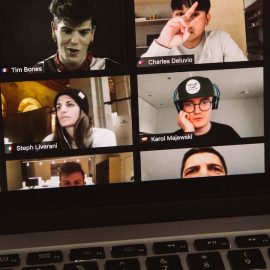

This article is an excerpt from the Shortform book guide to "Manage Your Day-to-Day" by 99U and Jocelyn K. Glei. Shortform has the world's best summaries and analyses of books you should be reading.
Like this article? Sign up for a free trial here.
Who’s in control of your electronic devices and notifications? Do they serve you, or do you let them waste your time?
Email and social media can be a blessing or a curse. Manage Your Day-to-Day offers insights and advice to help you use these tools to enhance your work rather than distract you from it.
Keep reading to get practical tips for managing distractions at work from Chris Bailey, Cal Newport, and others.
Managing Distractions at Work
For many of us, technology is the number one source of distraction. James Victore, designer, filmmaker, and author of Feck Perfuction, explains that many of us have allowed our devices, with their constant alerts and buzzing, to determine our priorities. He insists that the secret to developing a healthy relationship with technology and managing distractions at work is this: Remind yourself that you’re in control of how you focus your attention, and make sure you’re using technology in service of your priorities.
| Why Is Focusing So Hard? While you’re in control of how you focus your attention, Chris Bailey (Hyperfocus) explains why staying focused feels so hard. While our world has changed rapidly due to advances in industry and technology, our brains haven’t kept up. According to Bailey, we have three biological tendencies that make our brains ill-prepared for the modern world. 1. We default to autopilot mode. Instead of proactively choosing what to focus on, our brains tend to react to external triggers that catch our attention. Bailey explains that we have a natural inclination to respond to novel, potentially dangerous, or gratifying stimuli. While this instinctive response can be beneficial, it also makes us highly susceptible to distractions. 2. We can only pay attention to a limited amount of information. Our brains can only process and focus on a finite amount of information at any given time. With an overwhelming amount of stimuli competing for our attention in today’s fast-paced world, our limited attentional resources can easily become strained, leading to difficulty maintaining focus. 3. We love to task-shift. Our brains have a natural propensity to seek out new and different experiences, often leading us to switch from one task or activity to another. While this adaptability can be advantageous in certain situations, it also hinders sustained focus and productivity when we constantly shift our attention from one thing to the next. |
Social media and email are often the worst sources of distraction, easily pulling our attention away from more important work. Lori Deschene, the founder of Tiny Buddha, says that it’s important to pay attention to when and why you engage with social media. Social media can be helpful as long as you make sure you’re using it intentionally in a way that serves you and your work.
(Shortform note: In addition to setting time limits on your social media and removing apps from your home screen, you can be intentional about how you curate your social media feed. One social media director suggests looking through your feed with the goal of editing it. Only follow accounts that are informative or those that leave you feeling inspired or joyful, and unfollow or block any toxic content that doesn’t serve you or your goals.)
Aaron Dignan, the founder of The Ready and author of Brave New Work, has a similar suggestion for how to manage email. He suggests considering every email through the lens of your long-term goals by following two simple rules.
First, keep your long-term goals in mind. Email often pertains to how we manage the minutiae of our day, but, according to Dignan, most of those smaller tasks connect to larger goals. If you’re clear on your long-term goals, you can mentally organize your email according to how the correspondence impacts those goals. For example, if your long-term goal is to launch a successful startup, you can prioritize emails related to funding, partnerships, and product development over less impactful messages. He suggests writing your goals down somewhere visible and reviewing them every couple of months to make sure they’re still accurate.
Second, give yourself permission to say no. You’ll inevitably get emails that don’t have any connection to your goals or priorities. Don’t let distracting opportunities pull you away from what’s most important. You can’t do everything, so don’t try. If you get an opportunity or request that will distract you from your goals, say no, and move on.
| Changing the Culture of Email While Dignan offers individual strategies to address the challenge of navigating a relentless inbox, in A World Without Email, Cal Newport advocates organization-wide changes to minimize the number and frequency of emails you receive. For example, one of the systemic changes he calls for is establishing clear communication protocols within an organization. Newport argues that by implementing specific guidelines for when to use email versus other forms of communication, such as instant messaging or face-to-face meetings, you can significantly reduce the influx of unnecessary emails. This not only streamlines communication but also encourages more focused and productive exchanges. Additionally, Newport suggests adopting collaborative tools and project management platforms to centralize information sharing and task coordination, reducing the reliance on email for these purposes. By embracing these organizational changes, he explains, people can foster a culture that values efficient and purposeful communication, ultimately transforming the way we use email and improving overall productivity and well-being in the workplace. |

———End of Preview———
Like what you just read? Read the rest of the world's best book summary and analysis of 99U and Jocelyn K. Glei's "Manage Your Day-to-Day" at Shortform.
Here's what you'll find in our full Manage Your Day-to-Day summary:
- That creativity is the result of disciplined work habits, not innate genius
- Tips from experts on how to boost your creativity, focus, and productivity
- Why you should never strive for creative perfection






